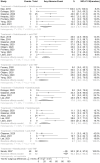Systematic Review With Meta-analysis: Safety and Effectiveness of Combining Biologics and Small Molecules in Inflammatory Bowel Disease
- PMID: 35310082
- PMCID: PMC8924906
- DOI: 10.1093/crocol/otac002
Systematic Review With Meta-analysis: Safety and Effectiveness of Combining Biologics and Small Molecules in Inflammatory Bowel Disease
Abstract
Background: Combining biologics and small molecules could potentially overcome the plateau of drug efficacy in inflammatory bowel disease (IBD). We conducted a systematic review and meta-analysis to assess the safety and effectiveness of dual biologic therapy (DBT), or small molecule combined with a biologic therapy (SBT) in IBD patients.
Methods: We searched MEDLINE, EMBASE, Scopus, Web of Science, Cochrane Database of Systematic Reviews, and Clinical trials.gov until November 3, 2020, including studies with 2 or more IBD patients on DBT or SBT. Main outcome was safety assessed as pooled rates of adverse events (AEs) and serious AEs (SAEs) for each combination. Effectiveness was reported as pooled rates of clinical, endoscopic, and/or radiographic response and remission. The certainty of evidence was rated according to the Grades of Recommendation, Assessment, Development, and Evaluation (GRADE) framework.
Results: Of the 3688 publications identified, 13 studies (1 clinical trial, 12 observational studies) involving 266 patients on 7 different combinations were included. Median number of prior biologics ranged from 0 to 4, and median duration of follow-up was 16-68 weeks. Most common DBT and SBT were vedolizumab (VDZ) with anti-tumor necrosis factor (aTNF, n = 56) or tofacitinib (Tofa, n = 57), respectively. Pooled rates of SAE for these were 9.6% (95% confidence interval [CI], 1.5-21.4) for VDZ-aTNF and 1.0% (95% CI, 0.0-7.6) for Tofa-VDZ. The overall certainty of evidence was very low due to the observational nature of the studies, and very serious imprecision and inconsistency.
Conclusions: DBT or SBT appears to be generally safe and may be effective in IBD patients, but the evidence is very uncertain.
Keywords: Crohn’s disease; biologics; inflammatory bowel diseases; meta-analysis; ulcerative colitis.
© The Author(s) 2022. Published by Oxford University Press on behalf of Crohn's & Colitis Foundation.
Figures



Comment in
-
Dual Biologic or Small Molecule Therapy in Refractory Pediatric Inflammatory Bowel Disease (DOUBLE-PIBD): A Multicenter Study from the Pediatric IBD Porto Group of ESPGHAN.Inflamm Bowel Dis. 2024 Feb 1;30(2):159-166. doi: 10.1093/ibd/izad064. Inflamm Bowel Dis. 2024. PMID: 37042978
References
-
- Lichtenstein GR, Loftus EV, Isaacs KL, et al. ACG clinical guideline: management of Crohn’s disease in adults. Am J Gastroenterol. 2018;113(4):481–517. - PubMed
-
- Rubin DT, Ananthakrishnan AN, Siegel CA, et al. ACG clinical guideline: ulcerative colitis in adults. Am J Gastroenterol. 2019;114(3):384–413. - PubMed
-
- Torres J, Bonovas S, Doherty G, et al. ECCO guidelines on therapeutics in Crohn’s disease: medical treatment. J Crohns Colitis. 2020;14(1):4–22. - PubMed
-
- Hirten RP, Iacucci M, Shah S, et al. Combining biologics in inflammatory bowel disease and other immune mediated inflammatory disorders. Clin Gastroenterol Hepatol. 2018;16(9):1374–1384. - PubMed
Grants and funding
LinkOut - more resources
Full Text Sources
Medical
